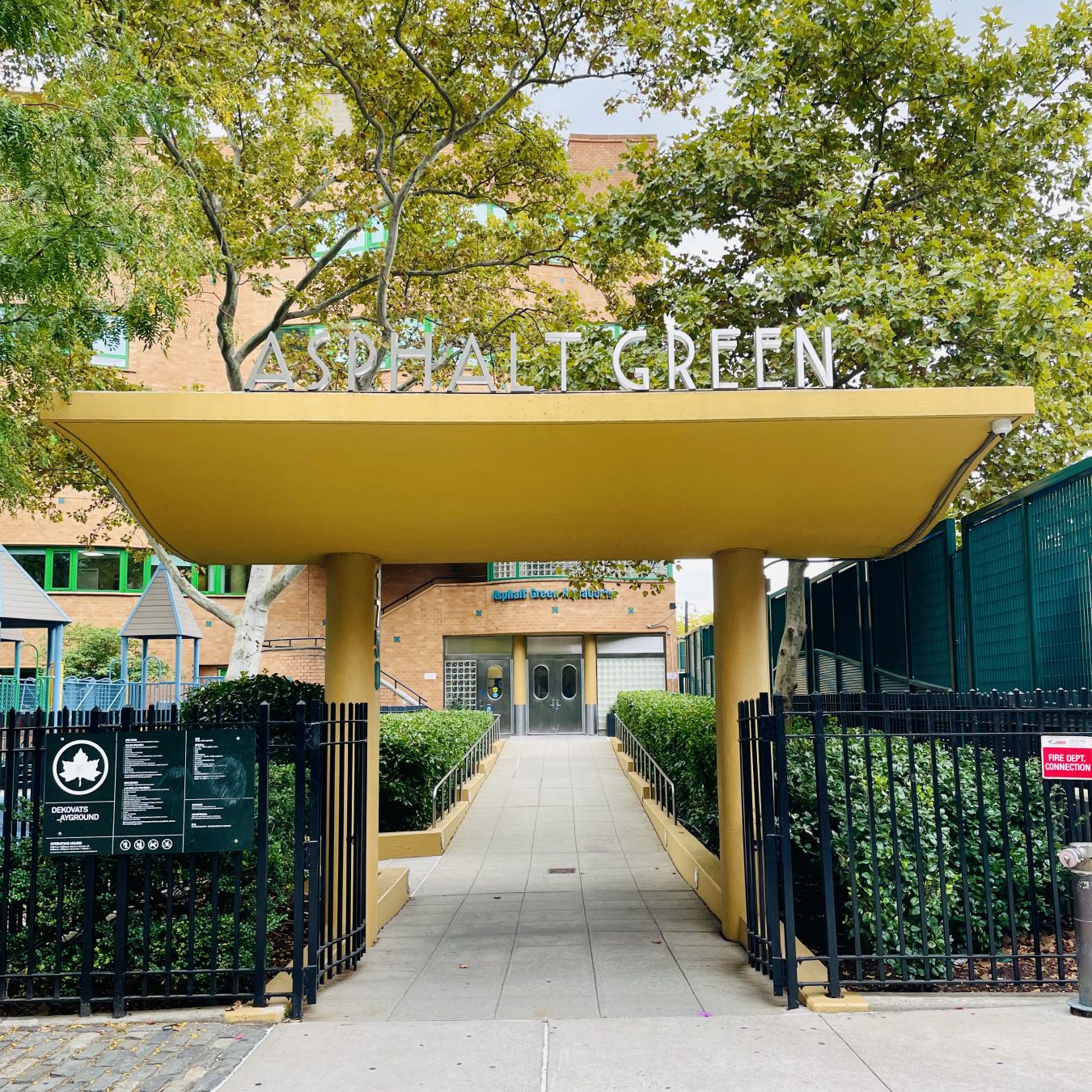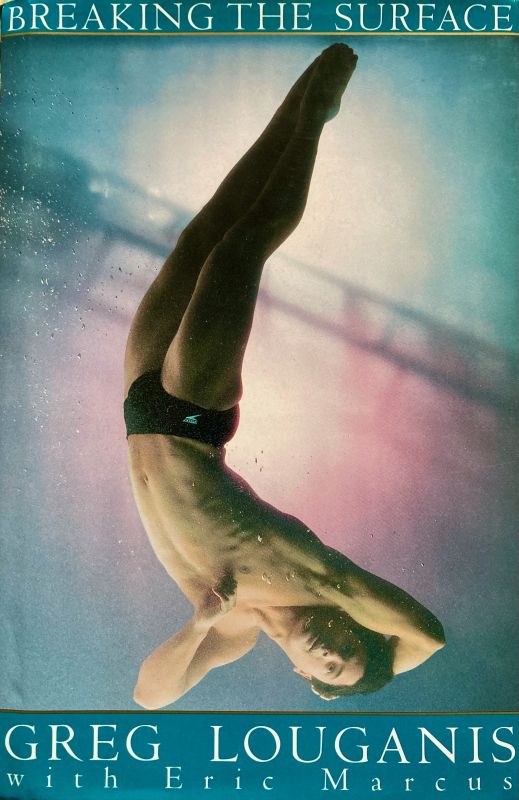
Greg Louganis & Gay Games IV at Asphalt Green AquaCenter
overview
The Asphalt Green AquaCenter, located in the Yorkville section of Manhattan, was the venue for the swimming, diving, and water polo events during the 1994 Gay Games.
Making headlines across the country was Olympic diving icon Greg Louganis, who participated in his first athletic event as an openly gay man at the AquaCenter after publicly acknowledging his sexual identity two days earlier at the Opening Ceremony.
History
From June 18 to 25, 1994, New York City hosted Gay Games IV, an international sports and culture event. The Asphalt Green AquaCenter hosted the swimming, diving, and water polo events. Located north of East 91st Street and west of the FDR Drive in Yorkville, the AquaCenter opened in a new building in 1993 as part of a northern expansion to the Asphalt Green sports complex. (Asphalt Green takes its name from the former Municipal Asphalt Plant on the site.)
The official Gay Games guide noted that the “brand new state-of-the-art facility will host one of the week’s most popular events, with 10 sessions of Lycra-clad beauties.” Seven gay and lesbian swimmers set 12 world records, led by Olympic gold medalist Bruce Hayes, of New York City, with four. According to the Boston Globe, a prominent Boston physician who won a gold medal in swimming would not allow his name to be printed because of concerns for his professional life if people knew he was gay. The Globe also noted that a pageant, called the Pink Flamingo, was closed off to the media “after a heated debate over whether it projected a positive image about gay men and lesbians.”
The most famous sports participant at the AquaCenter, and of the entire Games, was Olympic diving icon Greg Louganis (b. 1960), widely considered the greatest diver in history. Winning a silver medal at the 1976 Olympics and four golds in 1984 and 1988 before retiring, the Gay Games was his first appearance as an openly gay athlete. Louganis, who is half Samoan, initially found solace in diving during a difficult childhood in which he faced racist and homophobic slurs. As a professional diver, rumors about his sexuality resulted in only one major endorsement deal (with Speedo), despite being a globally recognized and highly marketable star athlete. At the 1988 Olympics, he faced the added pressure of competing while secretly living with HIV. (This was known to only a few people until his 1995 memoir.)
The 1994 Gay Games was a watershed moment for Louganis. On Monday, June 20th – two days after coming out publicly as gay in a pre-recorded welcome message at the Opening Ceremony at Columbia University’s Wien Stadium – he took part in a special four-dive exhibition at the AquaCenter. The experience was so rewarding that he offered to announce the diving competition that evening. He returned two days later to announce again and do another exhibition.
In the diving world, I’d always been something of an outsider because I was gay. Now here I was with a group of divers who were gay and I didn’t have to feel at all self-conscious. I could be myself and not worry about being judged. That was incredibly liberating.
At a time when the sports world was extremely hostile to gay men, Louganis’s presence at the Games was picked up by multiple newspapers around the country. As he stood on the 3-meter diving board, wrote the New York Times, Louganis “grinned broadly, waved and accepted with a jittery grace a standing ovation from nearly 700 people.” Newsday reported that, “After each [dive] the crowd cheered wildly, and those lining the pool bowed in playful subservience. It was certainly a warm welcome.”
Lesbian and gay athletes spoke to journalists about the credibility that someone of Louganis’s caliber gave to the Games. The Times coverage mentioned that Mike Wantuck, who oversaw the diving competition, said that Louganis displayed rare courage that would inspire many closeted athletes. As reported in the Washington Post,
Seeing Greg Louganis is great for a [gay] kid because he can say, ‘Look, there’s someone like me, and look how beloved and successful he is.’
Louganis credits his experience at the 1994 Gay Games with giving him the confidence to talk publicly about his sexual identity and, later, his HIV status. He also became an advocate for gay and lesbian athletes. Two weeks after the Games ended, while accepting a prestigious award from the United States Olympic Committee, he shocked the audience of 1,000 people by speaking about his life-changing experience in New York and how important it was “for athletes to feel welcome for who they are.” He then threw his support behind the ongoing (and soon successful) fight to move the volleyball preliminaries for the 1996 Olympics out of Cobb County, Georgia, where an anti-gay resolution had been passed in 1993.
Louganis has since become a mentor to the U.S. Diving team and a spokesperson for athletes living with HIV. He also works with groups such as the Trevor Project and Athlete Ally. Louganis was inducted into the International Swimming Hall of Fame in 1993 and was an inaugural inductee to the National Gay and Lesbian Sports Hall of Fame in 2013.
Entry by Amanda Davis, project manager (September 2024).
NOTE: Names above in bold indicate LGBT people.
Building Information
- Architect or Builder: Richard Dattner
- Year Built: 1993
Sources
David Lennon, “Louganis: Quiet Hero,” Newsday, June 21, 1994, A45. [source of Newsday quote]
“Diving Legend Greg Louganis on Celebrating Pride Month,” YouTube, NowThis Impact, June 18, 2018, bit.ly/3MfZz2c.
D.L. Cummings, “Louganis: He’s gay…and he’s loud,” Daily News, July 8, 1994, 77.
The Games Guide, June 1994, via University of North Texas Libraries Special Collection, bit.ly/4d4MAM6. [source of guide quote]
Greg Louganis, with Eric Marcus, Breaking the Surface (Naperville, Illinois: Sourcebooks, Inc., 1995). [source of Louganis pull quote and his “for athletes to feel welcome…” quote]
“History,” Asphalt Green, bit.ly/4dYG0Ho.
James C. McKinley Jr., “GAY GAMES; Louganis Still Performs Like Gold Both Off the Board and on the Mike,” The New York Times, June 21, 1994, 16. [source of Times quote]
Karen Rosen, “Louganis openly activist,” The Atlanta Journal-Constitution, July 8, 1994, D4.
“Louganis talks openly of homosexuality,” Columbia Daily Tribune, July 8, 1994, 4B.
Rachel Alexander, “GAY GAMES: Louganis Brings Fame to Diving Exhibition,” The Washington Post, June 21, 1994, C2. [source of Sohn quote]
Steve Fainaru, “Beating Prejudice,” The Boston Globe, June 24, 1994, 90.
Do you have more information about this site?
This project is enriched by your participation! Do you have your own images of this site? Or a story to share? Would you like to suggest a different historic site?







